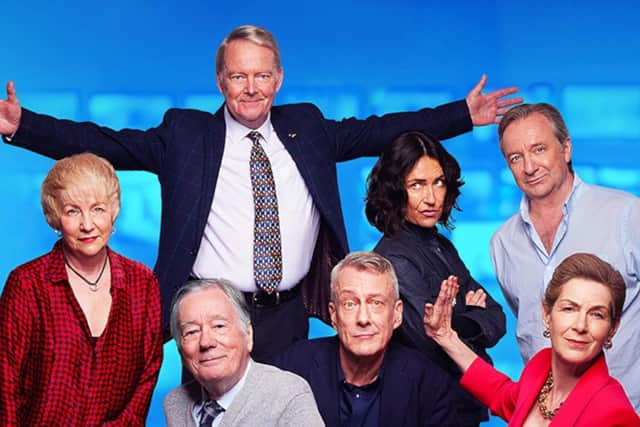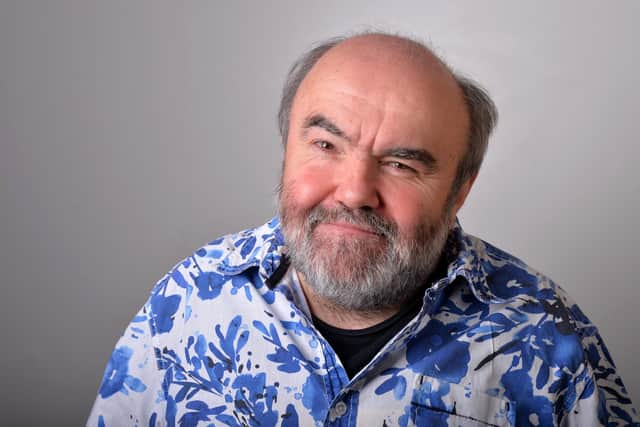Drop the Dead Donkey co-creator Andy Hamilton on getting the cast back together for stage version
It’s hard to believe but it is now more than 30 years since the ground-breaking sitcom Drop the Dead Donkey arrived on our TV screens.
Created by comedy writing duo Andy Hamilton and Guy Jenkin, it was set in the office and studio of fictional TV news company Globelink News and debuted on Channel 4 in August 1990.
Advertisement
Hide AdAdvertisement
Hide AdIt quickly gained a loyal following, regularly attracting millions of viewers over its eight-year run, and it won several awards including a BAFTA and an International Emmy.


A well-observed workplace comedy, with right up to the minute topical gags, it featured nicely drawn characters including bickering news anchors Henry Davenport (David Swift) and Sally Smedley (Victoria Wicks), slightly out of his depth editor George Dent (Jeff Rawle), efficient assistant editor Alex Pates (played by Haydn Gwynne in the first two series), self-aggrandising foreign correspondent Damien Day (Stephen Tompkinson), womanising deputy sub-editor Dave Charnley (Neil Pearson), dour PA Joy Merryweather (Susannah Doyle), no-nonsense assistant editor Helen Cooper (Ingrid Lacey, replacing Gwynne in series three) and management-speak spouting chief executive Gus Hedges (Robert Duncan), emissary of the never seen but oft-referred to owner Sir Roysten Merchant (the fact that he shared initials with a real-life media mogul was presumably entirely coincidental).
Most of the original cast are now back together (Swift sadly died in 2016 as did Gwynne in 2023) for a new touring stage show Drop the Dead Donkey: The Awakening which heads to Leeds next month.
“A few years ago, when the world suddenly seemed to be going a bit mad and you had the whole question of fake news starting to emerge, Guy and I had a few conversations around the idea that it might be funny to take those characters from Drop the Dead Donkey and place them into this new situation thirty years on,” says Hamilton.
Advertisement
Hide AdAdvertisement
Hide Ad“More recently with the emergence of things like AI and so on, it started to feel even more timely. Then we were in a meeting with a theatre producer about something else completely which didn’t seem to be going anywhere and he asked if we had any other ideas. We mentioned this one and he said why don’t we do that. Like a lot of things, it started with a conversation, then we got the cast together in my garden and it developed from there.”


What made it easy to get the cast together after such a long period was the fact that the whole team are still close friends and meet up regularly. “We all stayed in touch,” says Hamilton. “We would go together to see each other’s shows and organised two dinners a year and then during lockdown we did Zoom quizzes every couple of weeks, so it is a tight friendship group.
"The whole thing was incredibly enjoyable and they are a lovely bunch of people. They are all excellent actors and great company, so it has been wonderful revisiting it and reuniting everybody.”
The tour, which began at the end of January, has proved very successful so far, attracting big audiences around the country and positive reviews.
Advertisement
Hide AdAdvertisement
Hide AdWhile some of the show’s success will certainly be down to a sense of nostalgia among those who watched the original on Channel 4 three decades ago, it is also a production that has things to say about today’s politics and media landscape.
“It does feel as though it’s a revival because it is the same characters played by the same people, but it is also a play about what is happening now,” says Hamilton. “If anything, it has become even more relevant with each passing day. This year is a year of a lot of elections, so it is an important political setting and the question of how news is presented is a very live and relevant one.”
The past few years have seen some pretty dark events unfold both nationally and internationally and with the 24-hour news cycle and the constant thrum of social media, it is difficult to avoid confronting those issues, but translating them into funny material must be quite challenging at times.
“There is a strong tradition in British comedy, and to some extent it is in human nature, to laugh at those things,” says Hamilton. “It is a way that people cope with things being grim – they choose to make jokes about it. It always feels like this is the worst time but it is hard to calibrate whether the news is genuinely more grim than say during the Cuban missile crisis, for example. Given that the audience feel fairly powerless, laughter is a good way to go…”
Advertisement
Hide AdAdvertisement
Hide AdFamously the TV shows were usually written and filmed in the week before broadcast with right up to the very last minute additions being included shortly before it went on air. These were delivered by various members of the cast in voiceover during the credits.
Hamilton and Jenkin are continuing this tradition for the stage show.
“We are refreshing it all the time with new topical jokes,” says Hamilton. “One of us will go into each new venue to bed the show in and we will bring along new jokes. It keeps things fresh and it means the show will be slightly different depending on where you see it.”
The TV series didn’t hold back in its criticism of the government and politicians of the day. When they started Margaret Thatcher was still in power – just – she was quickly replaced by John Major. And by the time the sixth and final series aired in 1998, New Labour were a year into their first term.
Advertisement
Hide AdAdvertisement
Hide Ad“Actually, what was really disappointing was that we got very little pushback from politicians,” says Hamilton.
“I can remember Virginia Bottomley saying that it was her favourite show. The week before she had featured in the script referring to her name as an anagram of I’m an Evil Tory Bigot. But politicians when asked about their favourite things tend to go for what’s popular or trendy at the time.
"And we were trendy in that sense – we were a new show that was picking up an audience very quickly. Right at the beginning we got an angry fax from a Tory MP complaining about a joke about Margaret Thatcher, but nothing came of it. We even had a few politicians on the show including Neil Kinnock and Ken Livingstone.”
The show’s memorable title has become part of comedy lore, but it could have been quite different. “The first title we came up with was Dead Belgians Don’t Count,” says Hamilton.
Advertisement
Hide AdAdvertisement
Hide Ad“Channel 4, not unreasonably, said that it might affect sales in Belgium. Then we toyed with Dead Kuwaitis Don’t Count which was also rejected, thankfully, because just as the first episodes were about to go out Sadam Hussein invaded Kuwait. We were looking for something that they might shout at one minute to six when they were reorganising the running order.
"We never worked out the story that it related to. We got a lot of journalists at the time claiming that they knew where the expression came from – but in reality, we just made it up.”
Drop the Dead Donkey: The Reawakening is at Leeds Grand Theatre, April 9-13. leedsheritagetheatres.com
Comment Guidelines
National World encourages reader discussion on our stories. User feedback, insights and back-and-forth exchanges add a rich layer of context to reporting. Please review our Community Guidelines before commenting.